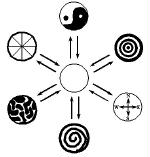|
|
|
|
A Releasing Your Unlimited Creativity discussion topic | |
|
Copyright 2009 by K. Ferlic, All Rights Reserved | |
| RYUC Home Why free? Contact Links Programs Services Contributions List of Topics | |
|
Our creative power/Creative Power lies in feeling and what we feel. We have to feel in order to be catalyzed to create. It is our passion and the flow of energy we feel is what allows us to take action in life. Without feeling there is no motivation to create. As we opening ourselves to feeling, we will find our creative power/Creative Power also increases. We will find an awareness and an ability to know certain things that was not previously available. Yet it was always there, we just had to open ourselves to what we feel. To create what we desire we need the passion a drowning person has for air. We must feel what we desire throughout our entire being. We cannot hold these desires only in our mind. We must feel them within our being. We must know what we desire is really what we want to do and our life will be somehow incomplete without creating what we desire. A catalyzing memory is a memory which causes us to feel the passion a drowning person has for air or at least came as close to that passion as possible. It is a passion that we feel throughout our entire being for what we desire to create whenever this memory is recalled. There are three ways to obtain a catalyzing memory. One way in which catalyzing memories are obtained are those memories which arise as a result of the normal experiences we have in life. That is, we have some type and kind of experience that is of profound proportions. The experience is so profound that whenever we remember that experience we are catalyzed in some way. The experience could be pleasurable, sad, traumatic, an "Ah" inspiring experience or whatever. Often the experience is inconsequential to another. But, for us, there is great inspiration and passion. The second way a catalyzing experiences is gained is the memory of those experience which mark passages or transitions in life. For example, graduations, indoctrinations, civil ceremonies such a marriage or passage in adulthood, retirement ceremonies, public oaths and/or vows, and the like which reflect a transition in life and/or a change in commitment in life. That is, any experience which after the experience, we have a different role to play in our world and we become different can create catalyzing memories. After having the experience we can no longer live our life in the way we lived it before the experience. It is a catalyzing experience in that the ceremony reminds us of our role and/or commitment we made. In recalling the memory we are energize to move forward in times we may find difficult to otherwise find the energy to act. The third way to create a catalyzing memory is that we proactively and consciously create it. In this third way we create or elect to participate in something will allows us to know we have become different because of our participation. Creating rituals, ceremonies, metatheater and the like are excellent ways of exercising our creativity to create these memories. What we create can also function as an initiation into our own creative power for we are taking an active role at consciously creating our life. It needs to be noted that catalyzing memories which cause us to become passionate to act in the world can be judged positive or negative and/or constructive and destructive to our creative endeavors. A catalyzing memory which causes us to feel deep love is considered positive where as a catalyzing memory which causes us to hate and/or become angry is considered negative. Similarly the memory which causes us to love could be destructive to our creative power if it prevents us from acting when we need to act if we do not understand love is about giving to meet the true needs of a creation. Similarly, hate and anger could be constructive or destructive to our creative power. It can cause us to become very focused or cause us to scatter and fragment our energy. It looking at catalyzing memories one should not judge the catalyzing memories we have. Rather, we should seek to understand the memory and how it catalyzes us to act and from where the energy to act arises. The root at the source of the energy to see if the motivation lead to wholeness within our being or separation. Anger, which is considered negative, can arise from a deep feeling of injustice which is considered positive. Similarly one can be catalyzed to help another which is considered positive but it can be motivated to get back another which is considered negative. In this regard there are two levels to catalyzing memories. One is that they catalyze us to act. The other is where or not the true motivation to act leads to wholeness or separation. The recommendation is to look at our catalyzing memories and explore their origins. We should ensure the true motivation to act leads us, or directs us, to a wholeness and integration within our being and to an awareness of oneness of Creation and an understanding as to how our action ripple out into Creation. Related topics The Password Protected Area provides access to all currently posted (click for current loading) Releasing Your Unlimited Creativity related discussion files and applications. |
|
| RYUC Home Why free? Contact Links Programs Services Contributions List of Topics | |
